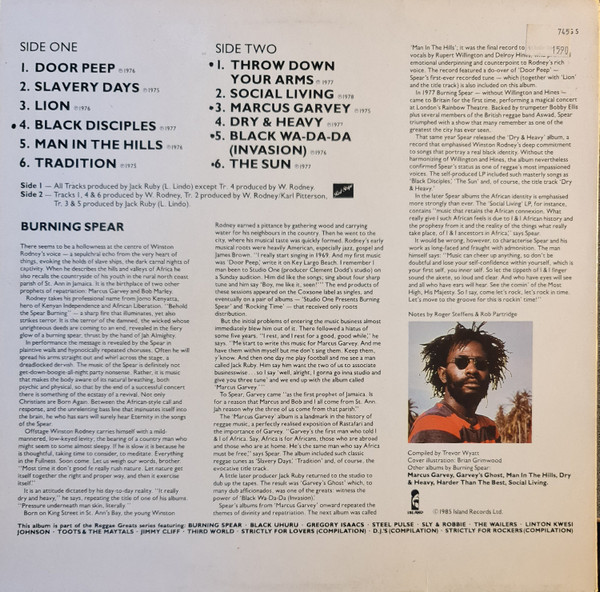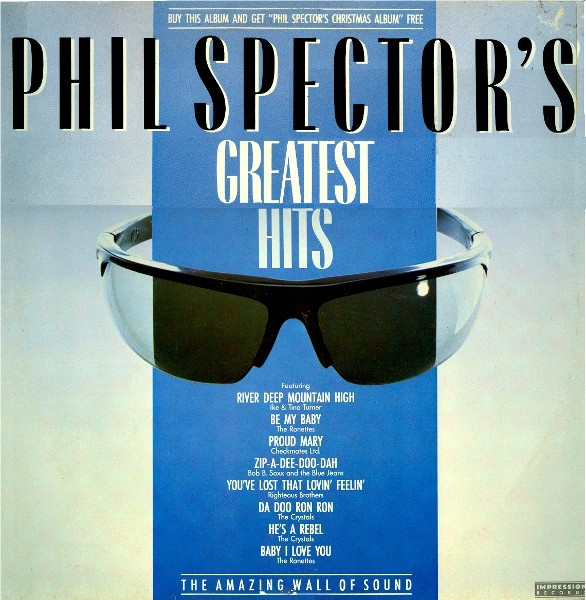Burning Spear: Reggae Greats

The tracks on this appetiser of a compilation from Burning Spear (Winston Rodney) are all taken from the most fertile 1975-1978 period for his righteous, fervent and often militant brand of roots reggae. He does, however, have the capacity to diversify slightly, and his 1977-78 material displays a lighter touch. Spear also knew the virtues of a bucolic existence and this is reflected in some of the songs on show here.
So, let's hike up into those green, Jamaican hills....
Door Peep, released as Spear's first, unsuccessful single, actually dated from back in 1969, when Winston Rodney, after a surprise meeting with Bob Marley while out waking in the fields, decided to go to Studio One to promote his work. It has a bit of a U-Roy roots feel about it, albeit with sweeter vocals.
Slavery Days is an iconic roots song with clear references - “Do you remember the days of slavery?”. It was also successfully covered by Third World in the following year. Lion is a fine roots cut from 1976's Man In The Hills album and Black Disciples is the best track from 1977's follow up album, Dry And Heavy. Actually, by 1977 it seemed as if Spear had settled down considerably by now, a lot of the righteous ire of 1975's Marcus Garvey had been diluted, no doubt by more time in the hills grinding coffee and enjoying the invigorating qualities of the sacred herb.
1976's Man In The Hills atmospherically champions a rural existence over an urban one, just as Jacob Miller did with his "Rasta c'yaan live in no tenement yard" sentiment. You get the sense that Winston Rodney was very much a country-loving guy.Tradition has an exhilarating, punchy horn backing and a trilling “duh-rrrooop-doo” backing vocal refrain. There's a great pounding drum sound on this track too. Throw Down Your Arms is another of Dry And Heavy's lighter, lilting numbers. Its skank is brassy and deep, but Spear's voice, along with the guitar, is light and tuneful. I love those light reggae guitars. You know them when you hear them. It gives tracks like this a lot of smooth, chilled-out atmosphere.
A similar groovy feeling can be had in 1978's gently insistent Social Living. This came from Spear's deepest, rootsiest album. In 1978 he reverted to a more hard-core, DJ-style roots sound, to great effect.
Marcus Garvey gives his name to Spear's 1975 album’s title and, indeed its powerful, horn-driven title track that we have here. This was very much a militant, issue-led song, with a dual attack of religious devotion and cultural awareness, as was so often the case with roots numbers. The mid to late seventies were fertile years for authentic roots reggae and this track is a fine example of what I am talking about. It remains arguably Spear's greatest song, certainly his most included in playlists.
Dry And Heavy is a deep dubby grind from 1977 that features some fine guitar once more. Black Wa-Da-Da (Invasion) is a marvellously deep dub version of Invasion from the Marcus Garvey album's dub partner, Garvey's Ghost. The Sun, back again to 1977, has a more uptempo, ever-so-slightly more carefree atmosphere to it.
Burning Spear was a devout, righteous man, but he could mix that with a melody. Roots with a rhythm.









